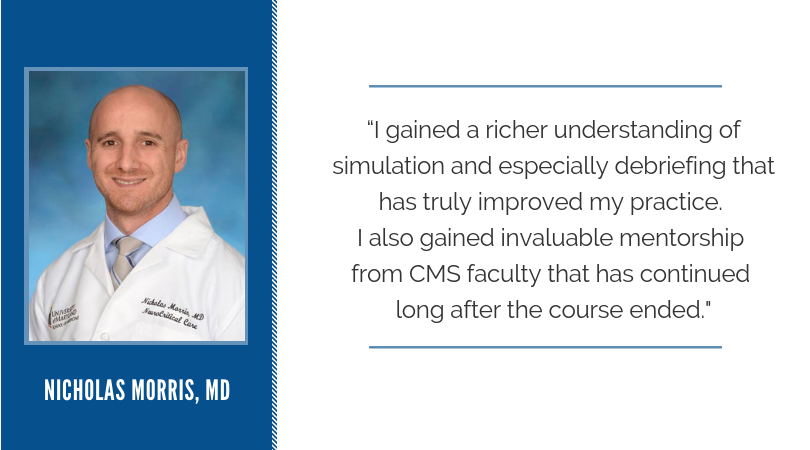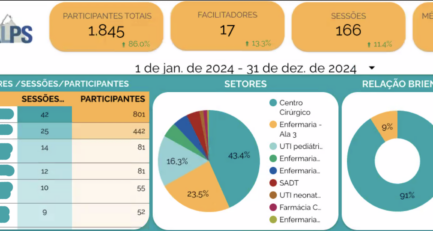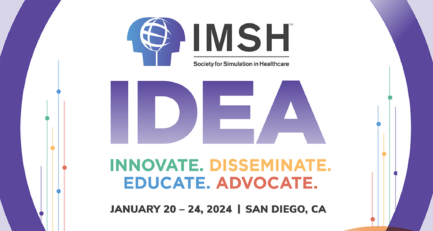
“Patient safety concerns have had the unintended consequence of divorcing novice learners from clinical decision-making,” says Nicholas Morris, MD. “Simulation affords them the opportunity to get hands-on experience and then re-engages them in the act of taking care of sick patients.”
Dr. Morris is an Assistant Professor of Neurology and the Associate Fellowship Director of the Neurocritical Care Fellowship at the University of Maryland School of Medicine.
“I first started working in simulation during my neurology residency when I helped develop a simulation for brain death determination. After a bit of a hiatus, I made simulation a regular part of my career as I started as an attending at the University of Maryland School of Medicine in 2016.”
While researching opportunities for simulation-based education training, a colleague of Dr. Morris’ recommended the Comprehensive Instructor Workshop at the Center for Medical Simulation (CMS). He applied to the course and was accepted to the August 2017 class. Over the course of the five-day workshop, Dr. Morris found himself “immersed in healthcare simulation with others who shared my passion.”
“I gained a richer understanding of simulation and especially debriefing that has truly improved my practice. I also gained invaluable mentorship from CMS faculty that has continued long after the course ended,” he says.
One CMS faculty member that Dr. Morris met during the week was Demian Szyld, MD, EdM, Senior Director of CMS’ Faculty Development Program. “We made a connection during the course and also talked during the lunch break one day,” says Dr. Szyld.
“Nick followed up with me about his upcoming grand rounds presentation and we brainstormed together,” says Dr. Szyld. “We wanted to leverage this opportunity to present to his department leadership to create opportunities to integrate simulation and contribute in a scholarly way.” The goal was to avoid a typical “this is simulation, and this is why you should do it” approach and make a compelling and credible appeal with a big dose of scholarship.”
In 2017, Dr. Morris delivered the finished work: Reclaiming Barrows’ Legacy: Medical Simulation for the Neurologist. “The ideas were seeded in the course and the hour-long follow-up call, and Nick then executed brilliantly. I love seeing our graduates succeed in this and other ways!” said Dr. Szyld.
The work completed for the Grand Rounds laid the foundation for continued research and a publication. “Inspired by Demian Szyld, I recently co-authored a review of simulation in neurocritical care that was published in our society’s journal,” says Dr. Morris.
Dr. Morris is continuing his simulation work at the University of Maryland School of Medicine and he is very excited about his next project: “I am currently working on validating simulation scenarios for assessment in neurological emergencies. I was lucky enough to receive a Faculty Innovation in Education award from the American Board of Psychiatry and Neurology to pursue this project.”
If you would like to learn more about Dr. Nicholas Morris, the Neurocritical Care Fellowship, and the Department of Neurocritical Care and Emergency Neurology at the University of Maryland School of Medicine, please visit: http://www.medschool.umaryland.edu/neurology/Divisions/Neurocritical-Care-and-Emergency-Neurology/

